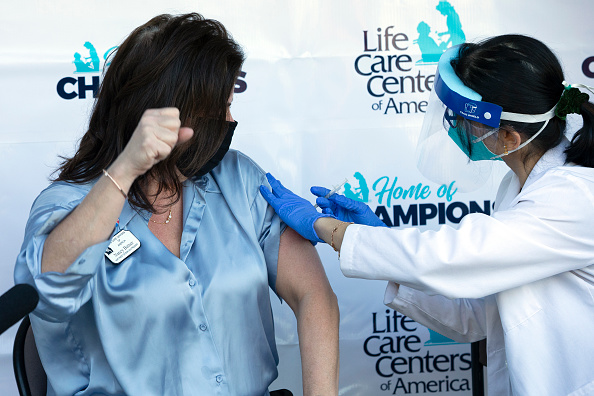As COVID-19 vaccines from Pfizer-BioNTech and Moderna become available across the nation, businesses are considering whether to make the shots mandatory for their employees.
United Airlines is one of the first companies to publicly acknowledge such a plan. Scott Kirby, the company’s chief executive order, told the Economic Club of Chicago that he believes vaccines will be accepted as easily as masks.
“It will just become what is expected and what most companies do,” Kirby stated, as reported by the Chicago Tribune on February 2.
Kirby told employees in January he wanted to make the vaccines a requirement, as long as his company was not the only one doing so, reported CNBC.
The Equal Employment Opportunity Commission (EEOC) issued guidelines on December 16 stating employers can require workers to receive vaccinations as a condition of work, with exceptions for disability or religious reasons.
Already, one state is showing resistance to employer vaccine mandates. Senate Bill 74, introduced in Indiana by Sen. Dennis Kruse, (R-Auburn) would allow workers to decline vaccinations for personal reasons.
Softer Approaches
Companies can either mandate vaccinations or win compliance through incentives or workplace educational campaigns.
Workers at Dollar General are currently offered extra pay to be vaccinated. Instacart employees are receiving a “Vaccine Support Stipend” of $25. Employees at Trader Joe’s can earn two hours of extra pay per vaccine dose they receive. Ticketmaster recently announced it would require attendees to prove vaccination or provide a negative COVID-19 test.
Tyson Foods, which employs 141,000 people, is not mandating the vaccine, but is strongly encouraging, says company spokesperson, Derek Burleson. The company will pay for the vaccine and compensate workers for up to four hours of pay if they take time off from work to get one.
“Right now, we’re focused on education, so our team members have accurate information to make a decision that’s right for them,” Burleson told Health Care News. “We’re sharing trusted, third-party information from the experts at Matrix Medical and the CDC (U.S. Centers for Disease Control and Prevention) about the vaccine to our team members. Information is being translated in multiple languages and team members now have access to a hotline to ask questions.”
Navigating the Risks
Unlike the vaccination for influenza, COVID-19 vaccines have been approved under emergency use authorization and have a limited track record for widespread use.
The vaccines are not recommended for children under age 16. The U.S. Food and Drug Administration (FDA) states the most common side effects include injection site pain, fatigue, headache, muscle pain, chills, joint pain, and fever, with more side effects reported after the second dose. More than 270 deaths and 10,000 adverse reactions have been reported to the CDC’s Vaccine Adverse Events Reporting System.
“While the deaths are a small percentage of the 26 million people who have received the vaccine, it is far more than the 23 deaths reported after the far more widely distributed, influenza vaccine,” said Jane Orient, M.D., executive director of the Association of American Physicians and Surgeons and policy advisor to The Heartland Institute, which co-publishes Health Care News.
Lesser known are the long-term side effects of a “warp speed” vaccine. “I think there is a recognition that ‘Operation Warp Speed’ means the vaccine was not thoroughly tested, was rushed through the process and may have unknown and unforeseen long-term consequences,” said Twila Brase, president, and co-founder of Citizens’ Council for Health Freedom and policy advisor to The Heartland Institute. “Thus far, most if not all, hospitals are letting health care workers decide whether they want to get the vaccine. In some hospitals, 50 percent of workers are refusing the vaccine.”
Not all facilities are so lenient. In Rock County, Wisconsin, a nursing home made headlines when an employed nurse was fired after failing to receive a mandated COVID-19 vaccination. A memo, dated December 23, included the requirement, stating lack of compliance would result in suspension.
In Brooklyn, New York, the Red Hook Tavern fired a waitress for refusing to get the vaccine for COVID-19, according to the New York Post on February 17. Bonnie Jacobson, age 24, said she is not against vaccines but had some concerns over the COVID-19 vaccines’ effect on fertility. “If I am not getting it, it’s my choice, and I’d only be hurting myself,” Jacobson told the Post.
No Recourse
One issue that may be holding back vaccine interest is lack of recourse if an individual suffers harm. Vaccine manufacturers are immune from liability, and one advocacy group, the Informed Consent Action Network, has called on the companies to waive their immunity from lawsuits. The group offers legal support to challenge vaccine mandates.
The immunity was part of the deal to rapidly get the vaccine on the market, Brase says.
“That said, the American people don’t understand several important things about the vaccines: the vaccines are not FDA-approved; they’ve only been given Emergency Use Authorization,” Brase said. “The paperwork people receive prior to being vaccinated clearly says that the vaccine is not FDA approved. In addition, the vaccine is not intended to prevent COVID-19. It’s intended to reduce symptoms if you get COVID- 19.”
Brase says most vaccines do not prevent disease. Rather, most vaccines just reduce severe symptoms. It is not clear whether the COVID-19 vaccines will stop transmission.
“The freedom to determine what is done to you medically, including the freedom to not be an involuntary research subject, is quintessential to Americans’ rights to life and liberty,” Brase said.
Ashley Bateman (bateman.ae@googlemail.com) writes from Alexandria, Virginia.





















